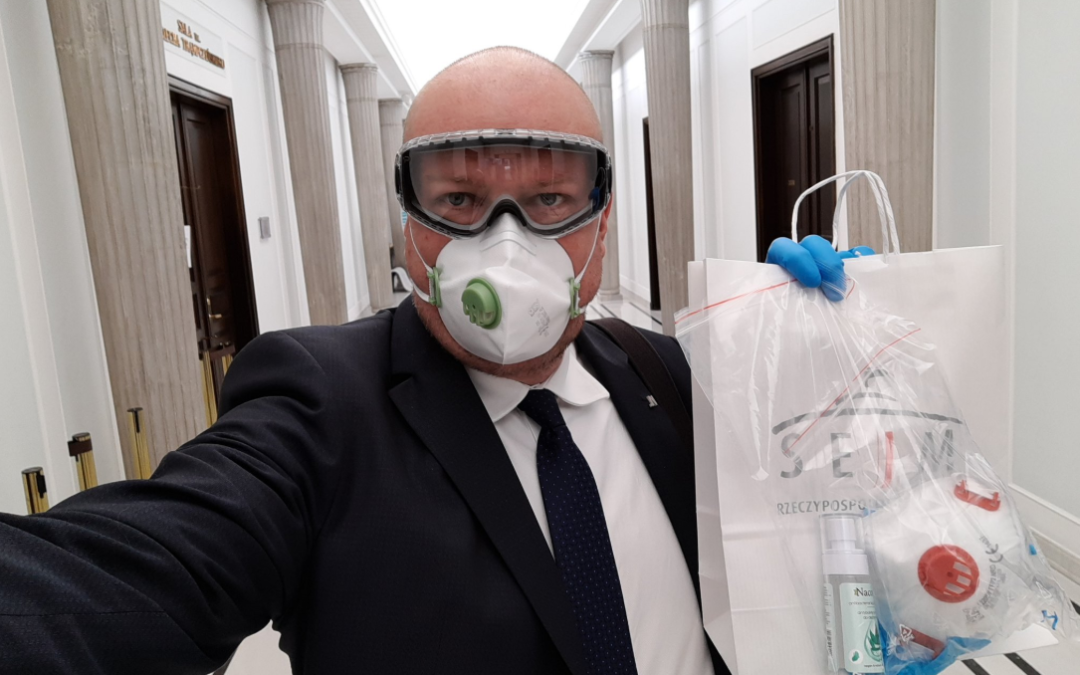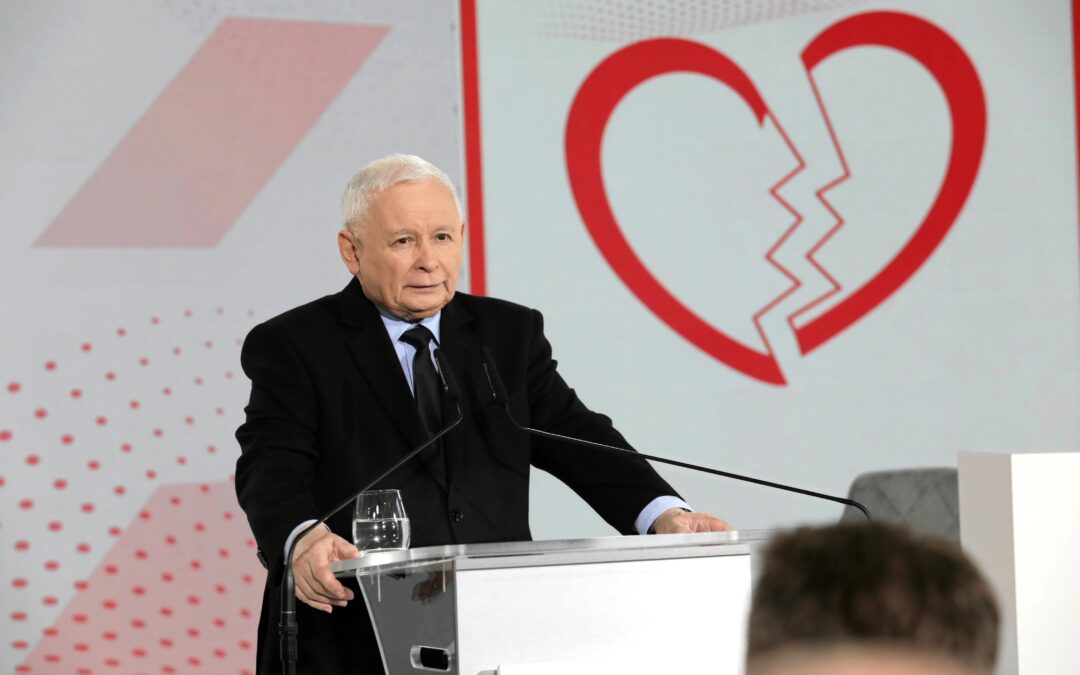The lower house of Poland’s parliament resumed work today for the first time in over three weeks. It met in order to debate and vote on amending parliamentary procedures to allow legislative work to be conducted remotely due to the coronavirus epidemic.
Several MPs decided not to attend the session, citing health concerns. Most of those who did participate wore protective clothing such as masks and gloves.
Meldujemy pełną gotowość do obrad ✌?
Po mojej lewej oczywiście @GoTracz z @Zieloni
Pozdrawiamy wszystkich na #homeoffice i #zostańwdomu
Howgh!#sejm #koronawirus #covid_19 #covid #corona #coronavirus #besafe pic.twitter.com/9OcUaGnUZ1— Franek Sterczewski (@f_sterczewski) March 26, 2020
The proposals were accepted in an evening vote, but only after a dispute over whether the session should have been held at all.
On Tuesday, the Presidium of the Sejm, consisting of the speaker, Elżbieta Witek, and five deputy speakers, recommended that the procedural changes, which would include temporarily allowing online voting, should themselves be approved online.
The European Parliament adopted similar measures for today’s plenary session, with member states agreeing to temporarily allow electronic voting by email until 31 July.
Yet in Poland’s case, the idea of having an online vote about introducing online voting was opposed by Civic Platform (PO), the main centrist opposition, and the far-right Confederation. They argued that it would violate both parliamentary procedure and the constitution, and could therefore invalidate all legislation passed thereafter.
Today’s session thus went ahead, but with a number of additional safety precautions, including MPs being spread out between various rooms in the parliamentary complex and very few present in the main chamber.
Niesamowite obrazki z Sejmu. Jarosław Kaczyński samotny w drugim rzędzie, Barbara Nowacka przemawia w masce, posłowie rozrzuceni po salach. pic.twitter.com/eQh5OSx5Fl
— Paweł Wiejski (@PWiejski) March 26, 2020
Even so, up to a third of MPs from some parties did not show, citing health concerns, reported Onet. The Left party said 10-15 of its 49 MPs would be absent, as they have previously either had cancer, undergone chemotherapy, or have partners who are unwell.
Also missing was a number of MPs from the agrarian Polish People’s Party (PSL), which opposed holding the session today. Two members of the grouping are currently in quarantine, while several others who are either “elderly or suffering from chronic illnesses” will also stay home, said the party’s spokesman.
Two MPs from the ruling Law and Justice (PiS) caucus – Michał Woś, the environment minister, and Edward Siarka – were diagnosed with the coronavirus last week. Agriculture minister Jan Krzysztof Ardanowski has also been put in quarantine after his deputy tested positive for the virus. A number of PiS MPs are being asked to stay home.
Wchodzimy do #Sejm.u na posiedzenie, by zmienić regulamin Sejmu i móc uchwalić przepisy antykryzysowe. Z zachowaniem procedur i środków ostrożności. #TarczaAntykryzysowa pic.twitter.com/Tgu0AnW3pS
— Hanna Gill-Piątek (@HannaGillPiatek) March 26, 2020
By contrast, PO, which pushed for today’s session, encouraged its MPs to turn up to the vote. The party’s leader, Borys Budka, defended its stance by saying that the legislature cannot “work outside the law” just because “someone is scared of showing up to work”, reported Onet.
Speaking to TV channel Polsat, Budka criticised MPs from PiS, the Left and PSL for prioritising “their own comfort and safety” and thereby “placing themselves above regular people who every day work in shops, factories, government buildings”, reported wPolityce.pl.
Budka noted that PiS party leader Jarosław Kaczyński is insisting that parliamentary elections go ahead as planned on 10 May, yet is allowing his own MPs to avoid voting in parliament, reported Onet.
Meanwhile Warsaw’s mayor Rafał Trzaskowski called into question the security and reliability of remote parliamentary meetings, after he was mistakenly emailed login details for the online session despite not having been an MP since 2018.
Confederation MP Michał Urbaniak, whose login details had been incorrectly sent to Trzaskowski, subsequently wrote on Twitter that the Sejm’s chancellery had assured him that they will not be henceforth sending out full login details in a single text message.
Właśnie otrzymałem login i hasło do posiedzenia Sejmu. Tak właśnie rządzący chcą profesjonalnie zapewnić bezpieczeństwo obrad.
PS W tej kadencji nigdy nie byłem posłem. pic.twitter.com/tTxZkQAqwz— Rafał Trzaskowski (@trzaskowski_) March 25, 2020
Eventually, just after 7pm, a vote was held in which 41 MPs were present in the main chamber, divided proportionally among the parties. Other MPs voted from separate rooms, with no more than 50 people in each. The session had to be temporarily halted at one stage due to a technical malfunction in one of the rooms, reported RMF FM.
In total, 368 of the Sejm’s 460 MPs voted. A majority of 250 approved allowing remote voting to be added to parliamentary rules, while 104 were opposed and 14 abstained.
The new parliamentary procedures are seen as vital to allow discussion and voting tomorrow on the government’s multi-billion economic support package to help shelter workers and businesses from the economic fallout caused by the coronavirus. The package was unveiled last week and given final approval by the government today, ready for parliamentary approval.
For all of our coverage of the coronavirus epidemic in Poland, see our constantly updated archive of stories here.
Main image credits: Witold Zembaczyński/Twitter

Maria Wilczek is deputy editor of Notes from Poland. She is a regular writer for The Times, The Economist and Al Jazeera English, and has also featured in Foreign Policy, Politico Europe, The Spectator and Gazeta Wyborcza.



















